Total Parenteral Nutrition for Cancer Patients: Tailoring Nutritional Support
Transforming Cancer Care Through Nutrition
Cancer significantly impacts a patient's nutritional status, which is often complicated by treatment side effects and disease progression. Total Parenteral Nutrition (TPN) emerges as a pivotal strategy for those unable to obtain nutrition via traditional means, offering hope for maintaining good health during tough treatments. This narrative explores the intricacies of TPN, its customization for cancer patients, and its essential role in overcoming oncological nutritional challenges.
Understanding Total Parenteral Nutrition (TPN)
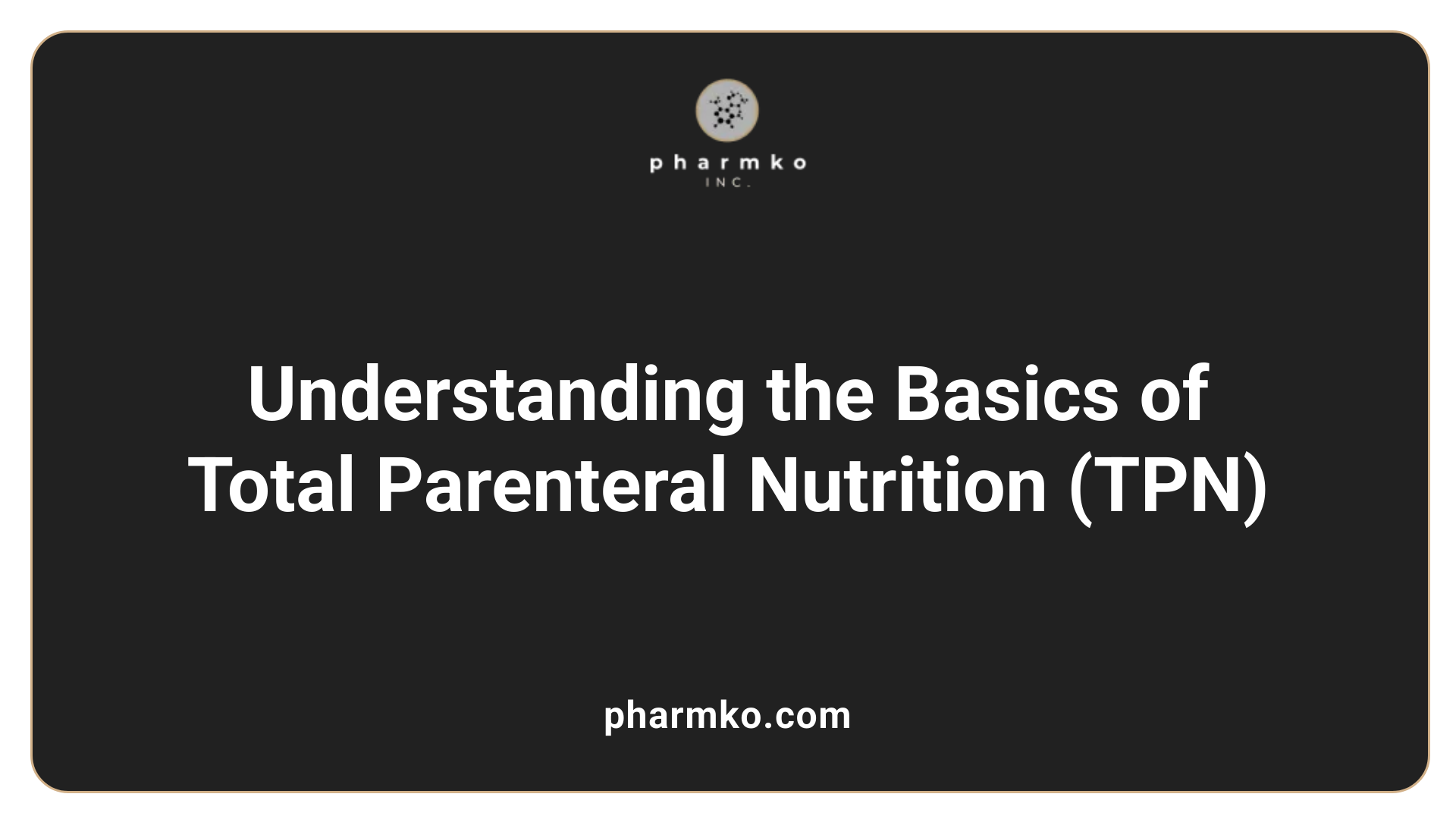
What is Total Parenteral Nutrition (TPN) and how does it work?
Total parenteral nutrition (TPN) is a method of supplying essential nutrients directly into the bloodstream via a central venous catheter, effectively circumventing the gastrointestinal tract. This approach is particularly necessary for cancer patients who cannot meet their nutritional needs orally due to conditions like gastrointestinal blockage or severe mucositis.
TPN is typically administered continuously over a span of 12 to 16 hours daily. Each regimen is tailored to the patient, factoring in variables such as weight, physical activity, and specific nutritional deficiencies. The TPN solution is composed of several key elements:
| Component | Function | Importance |
|---|---|---|
| Carbohydrates | Provide energy | Essential for metabolic processes |
| Proteins | Tissue repair and immune support | Crucial for maintaining lean body mass |
| Fats | Energy and hormone production | Important for overall health and absorption |
| Vitamins | Support various bodily functions | Necessary for metabolic regulation |
| Minerals | Electrolyte balance | Key for hydration and physiological functions |
| Water | Maintain hydration | Critical for overall body function |
Infection control is pivotal during TPN therapy, as there is an inherent risk of complications arising from the inserted catheter. Strict sterilization protocols are followed to reduce these risks. Additionally, regular blood tests monitor the patient's nutrient levels, allowing for any necessary adjustments to the TPN formulation. This proactive management helps mitigate potential complications such as hyperglycemia or electrolyte imbalances, ensuring that patients receive the optimal nutrition necessary for recovery.
Tailoring TPN for Cancer Patients' Needs
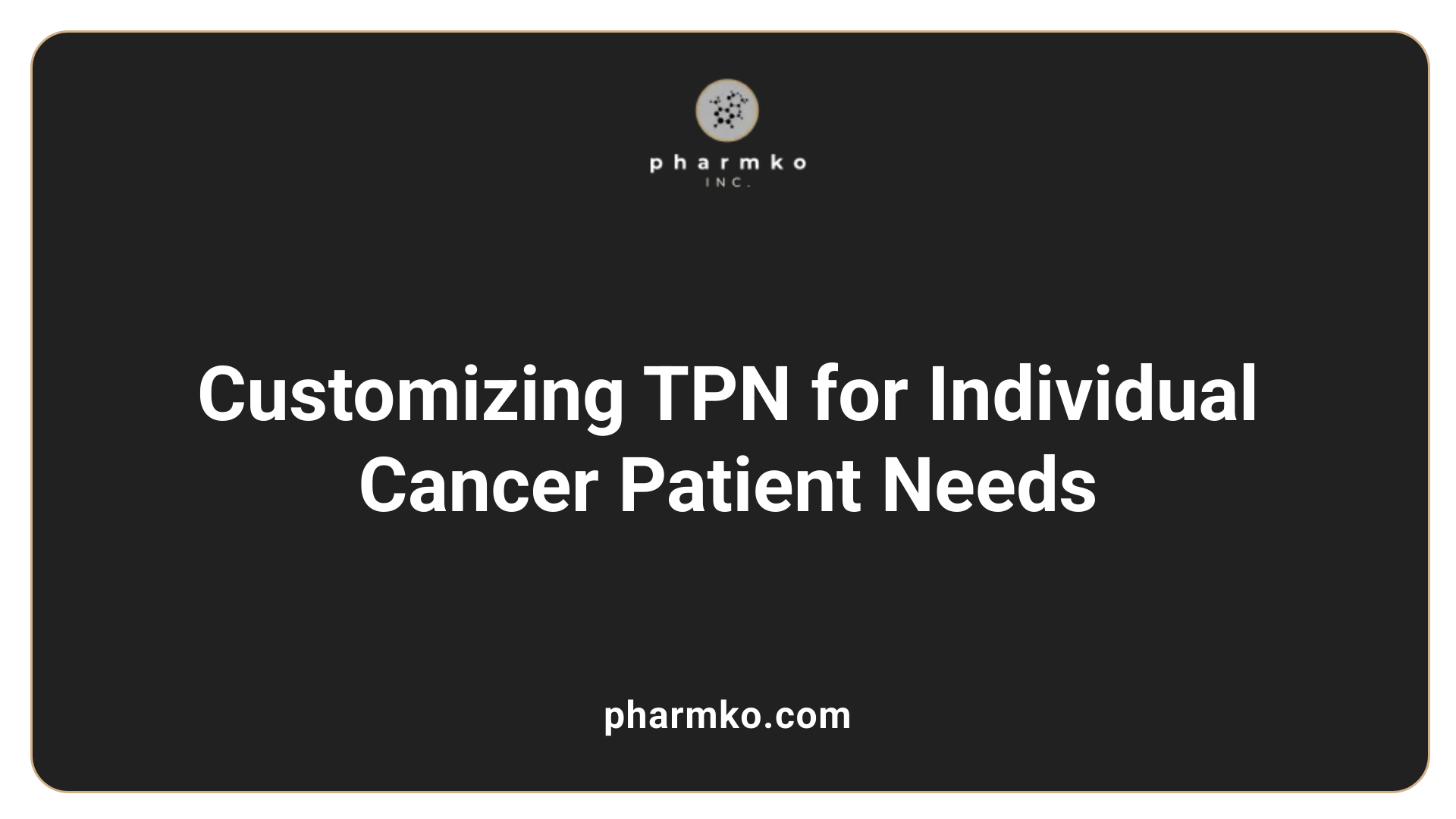
How can Total Parenteral Nutrition be customized to meet the nutritional needs of cancer patients?
Total Parenteral Nutrition (TPN) can be tailored for cancer patients by adjusting the macronutrient composition, including glucose, protein, and fats, along with essential vitamins and minerals. The customization process involves assessing each patient’s specific nutritional requirements based on their medical history, treatment plan, and overall health status. In cases of advanced cancer, careful consideration is necessary due to the associated risks and limited benefits of TPN. This nutrition support is primarily indicated for patients experiencing severe malnutrition or those unable to tolerate enteral nutrition.
What are the benefits and risks of Total Parenteral Nutrition for cancer patients?
TPN imparts various advantages for cancer patients lacking sufficient dietary intake. It ensures the delivery of essential nutrients directly into the bloodstream, facilitating weight maintenance, energy boost, and improved recovery outcomes. Nevertheless, TPN is not without its risks; complications can arise from catheter use, including infection, metabolic imbalances, and liver issues. Unlike enteral nutrition, TPN is critical for patients whose digestive systems are non-functional. As continuous monitoring is essential, healthcare providers like dietitians play a vital role in ensuring that the benefits of TPN outweigh its risks.
| Aspect | Benefits | Risks |
|---|---|---|
| Nutritional Support | Provides essential nutrients intravenously | Catheter-related infections |
| Weight Maintenance | Aids in preventing further weight loss | Metabolic imbalances |
| Recovery Improvement | Supports overall recovery during treatment | Potential liver complications |
| Indicated Use | For patients unable to meet nutritional needs | Requires close monitoring and regular assessments |
Ultimately, ensuring personalized TPN regimens through careful assessments can enhance outcomes for cancer patients undergoing treatment.
Exploring Nutritional Intervention Strategies in Cancer
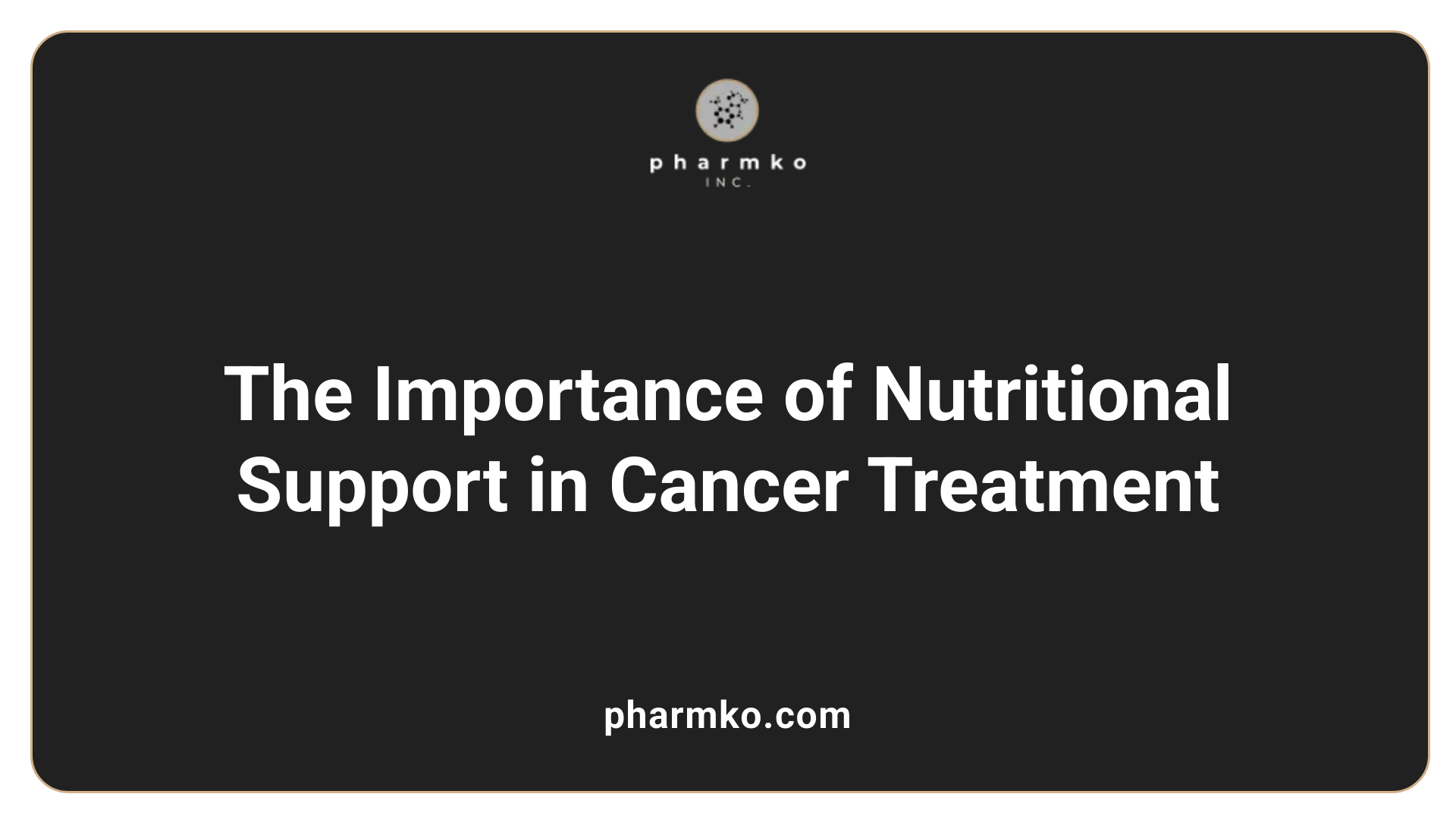
How important is nutritional support in treating malnutrition associated with cancer?
Nutritional support is vital in treating malnutrition associated with cancer, as it directly influences a patient's overall health and recovery. Both the disease and its treatments can alter eating habits and nutrient absorption. This makes it essential to provide tailored nutrition aimed at maintaining weight, strength, and energy levels in patients.
A balanced diet rich in proteins, carbohydrates, fats, vitamins, and minerals supports critical functions such as healing and immune system maintenance. For cancer patients undergoing treatment, proper nutrition can improve tolerance to treatment side effects and may enhance the efficacy of therapies. Additionally, addressing nutritional needs before, during, and after treatment can lead to improved health outcomes and facilitate faster recovery.
Impacts of Malnutrition on Cancer Outcomes
Malnutrition can drastically impact cancer patients, leading to a higher risk of morbidity and mortality. Studies suggest that malnutrition affects 40% to 80% of cancer patients, resulting in poorer treatment responses and overall survival rates. Cancer cachexia can exacerbate this issue, causing significant weight loss and muscle wasting, which contribute to fatigue and reduced quality of life.
As malnutrition is often correlated with treatment complications, careful monitoring and specific nutritional interventions are crucial. Nutritional assessments help identify those who are at risk and provide opportunities to mitigate detrimental health effects through appropriate interventions such as Total Parenteral Nutrition (TPN).
Role of TPN in Oncological Nutrition
Total Parenteral Nutrition (TPN) is particularly important for patients unable to meet their nutritional needs through oral intake. TPN delivers essential macronutrients and micronutrients intravenously, stabilizing nutritional status and preventing further deterioration. This is especially significant in situations like gastrointestinal toxicity from cancer treatments or when patients have significant malnutrition.
Despite the risks associated with its use, such as infections, TPN can potentially improve a patient’s functional status and contribute to better quality of life. Customized TPN regimens, based on individual needs, support recovery and enhance treatment outcomes for cancer patients who are malnourished or facing severe nutritional deficits.
| Topic | Description | Importance |
|---|---|---|
| Nutritional support | Critical for maintaining health during cancer treatment. | Influences recovery and quality of life. |
| Malnutrition impacts | Associated with poorer treatment outcomes and higher risk of complications. | Requires prompt intervention. |
| Role of TPN | Provides nutrients when oral intake is impossible or insufficient. | Stabilizes and improves nutritional status. |
Comparing TPN with Other Nutritional Support Methods
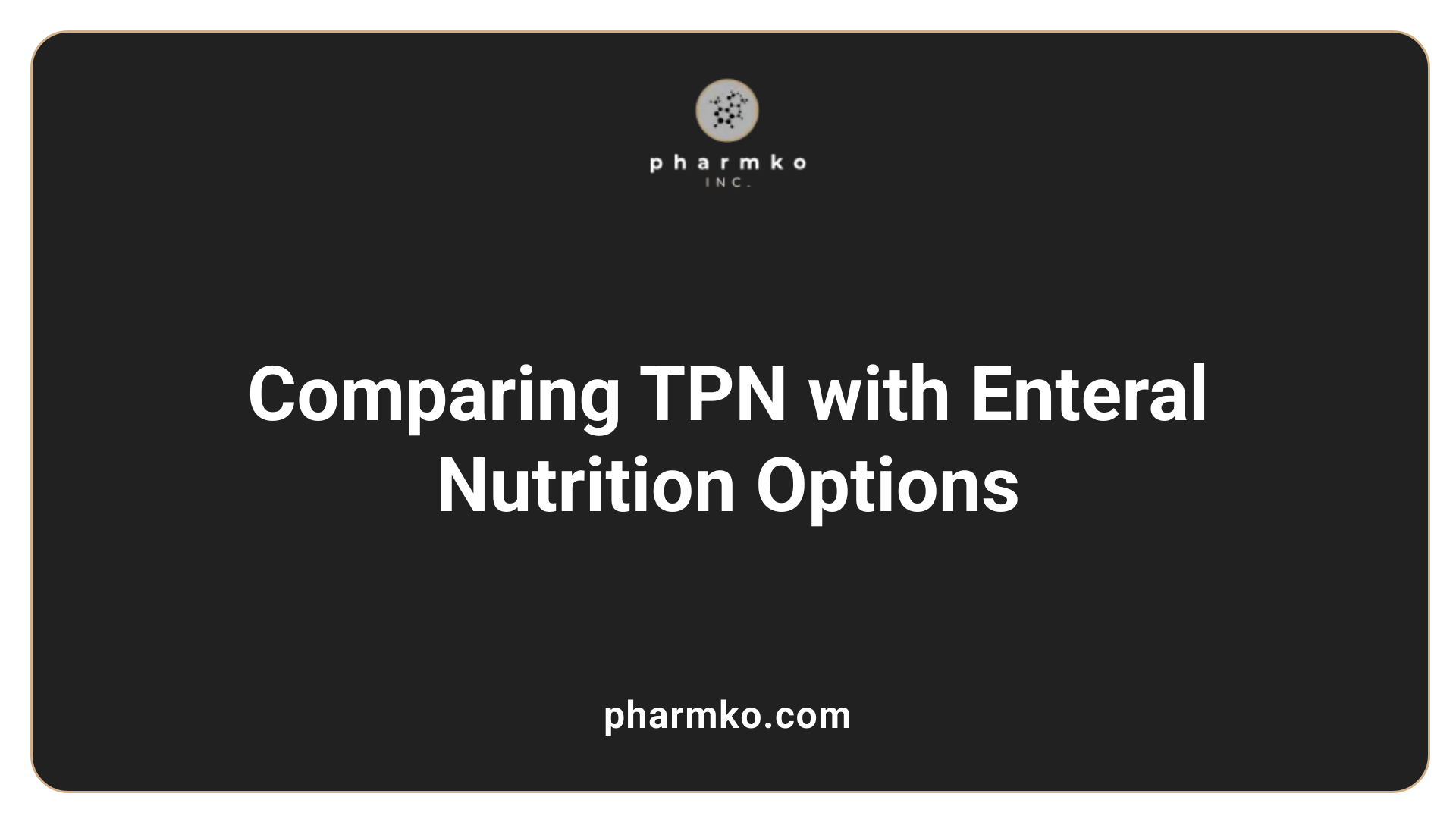
How does Total Parenteral Nutrition differ from other nutritional support methods?
Total Parenteral Nutrition (TPN) differs significantly from other forms of nutritional support like enteral nutrition. TPN administers nutrients directly into the bloodstream, bypassing the digestive tract entirely. This method is crucial for patients with severe gastrointestinal disorders or obstructions that hinder nutrient absorption. In contrast, enteral nutrition leverages the gastrointestinal (GI) tract, making it a preferred option when the gut is functional, as it supports immune health and follows normal digestion processes.
Situational use cases for TPN and enteral nutrition
TPN is generally recommended for patients facing issues like malignant bowel obstruction or severe mucositis, where oral or enteral feeding isn't feasible. It's essential for those who can’t maintain nutritional intake through conventional methods. Alternatively, enteral nutrition is suitable for patients who may struggle with eating but still have a functioning GI tract, offering a safer approach with fewer risks of severe complications.
| Nutritional Support Method | Delivery Method | Ideal Situations | Risks |
|---|---|---|---|
| Total Parenteral Nutrition (TPN) | Intravenous | Severe GI obstructions, inability to tolerate food | Infections, biochemical imbalances |
| Enteral Nutrition | Gastrostomy or feeding tube | Functional gut, difficulty eating | Aspiration, tube complications |
Choosing between TPN and enteral feeding requires careful evaluation by a nutrition support team to tailor the approach based on the patient’s specific condition and needs.
Optimizing TPN for Elderly Cancer Patients
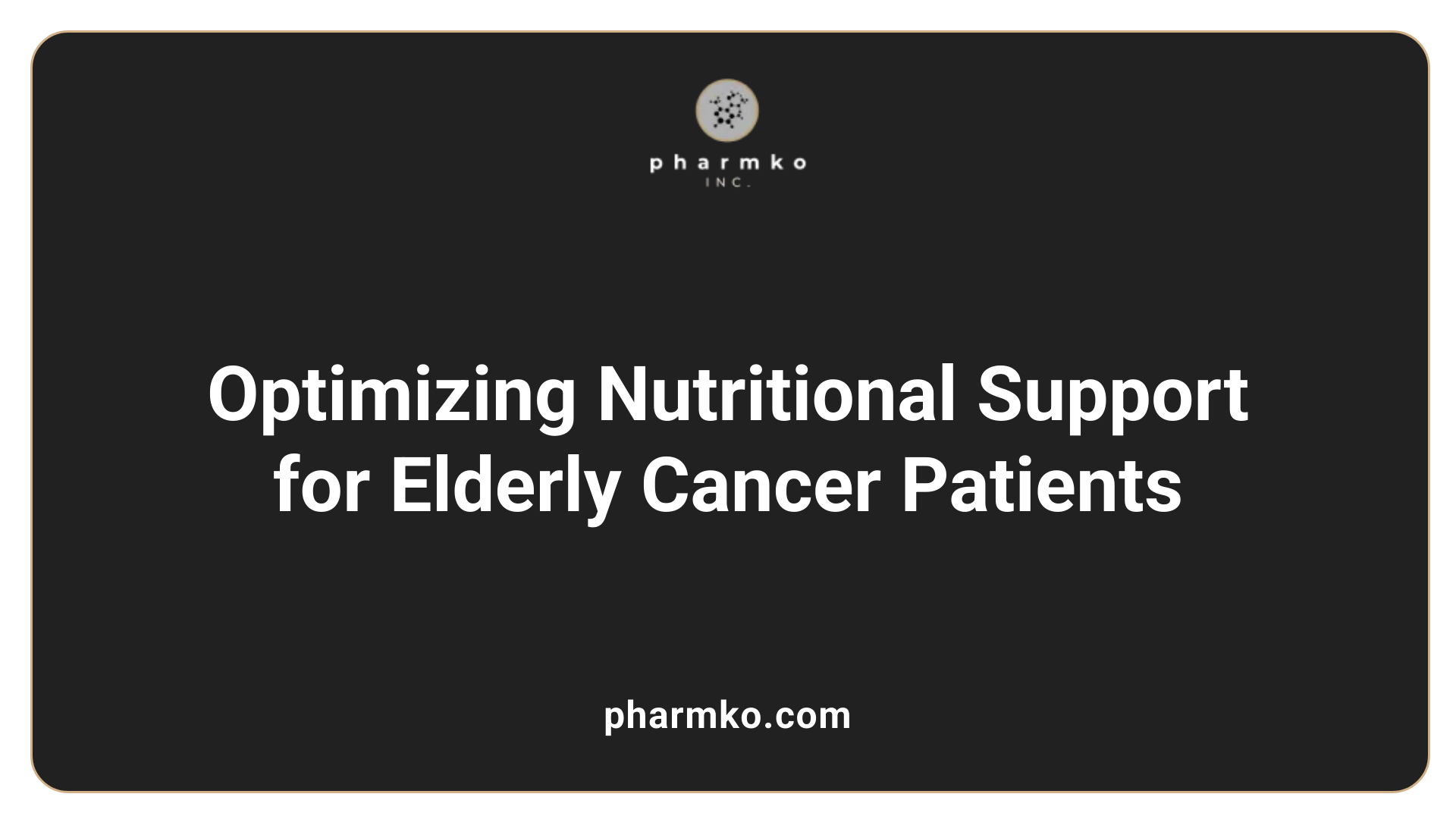
TPN in elderly cancer patients
Total Parenteral Nutrition (TPN) plays a vital role in supporting elderly cancer patients who may struggle with oral intake due to advanced disease. Many elderly cancer patients face challenges such as gastrointestinal toxicity and severe mucositis, which can hinder their ability to consume adequate nutrition. For those unable to gain sufficient nourishment through oral methods, TPN becomes an essential intervention.
Nutritional requirements for elderly patients
The nutritional needs of elderly cancer patients vary significantly, particularly in terms of energy and protein intake. For this population, estimates suggest that total energy expenditure is around 25-28 Kcal/kg/day due to reduced physical activity. Additionally, a protein intake of 1.5 g/kg/day or higher is often recommended to help preserve lean body mass and combat sarcopenia, which negatively impacts treatment outcomes.
Role in maintaining quality of life and functional status
Adequate nutritional support is crucial as it can enhance the recovery process and improve the overall quality of life. Studies indicate that TPN can improve survival and functional status, especially in patients with good performance and nutritional requirements. Therefore, personalized TPN regimens, based on each patient's individual assessment, prove invaluable in maintaining health and well-being during cancer treatment.
| Aspect | Importance | Recommendations |
|---|---|---|
| Nutritional Support | Essential for recovery and quality of life. | Use TPN when oral intake is inadequate |
| Energy Requirements | Vital to sustain elderly patients, who have reduced activity levels. | Target energy intake of 25-28 Kcal/kg/day |
| Protein Needs | High protein intake helps preserve muscle mass. | Aim for 1.5 g/kg/day of protein |
Future Directions in TPN for Cancer Care
As our understanding of cancer care advances, so does the approach to nutritional support. Research continues to focus on optimizing TPN formulations and identifying patients who would derive the most benefit from this intervention. As we move towards more personalized cancer treatments, tailored nutritional support like TPN could hold the key to improving patient quality of life and treatment outcomes significantly. Keeping pace with evolving scientific insights will ensure that TPN remains a viable option for patients needing comprehensive nutritional solutions.
References
- Total parenteral nutrition in cancer patients - PubMed
- The role of parenteral and enteral/oral nutritional support in patients ...
- TPN for Cancer Patients - AmeriPharma® Specialty Care
- Total parenteral nutrition for patients with gastrointestinal cancers
- 1399 Role of total parenteral nutrition in the provision of nutritional ...
- Nutrition in Cancer Care (PDQ®)–Health Professional Version
- Enteral and parenteral nutrition for adults - Stanford Health Care
- Enteral and Parenteral Nutrition Support
- Tailoring the nutritional regimen in the elderly cancer patient













